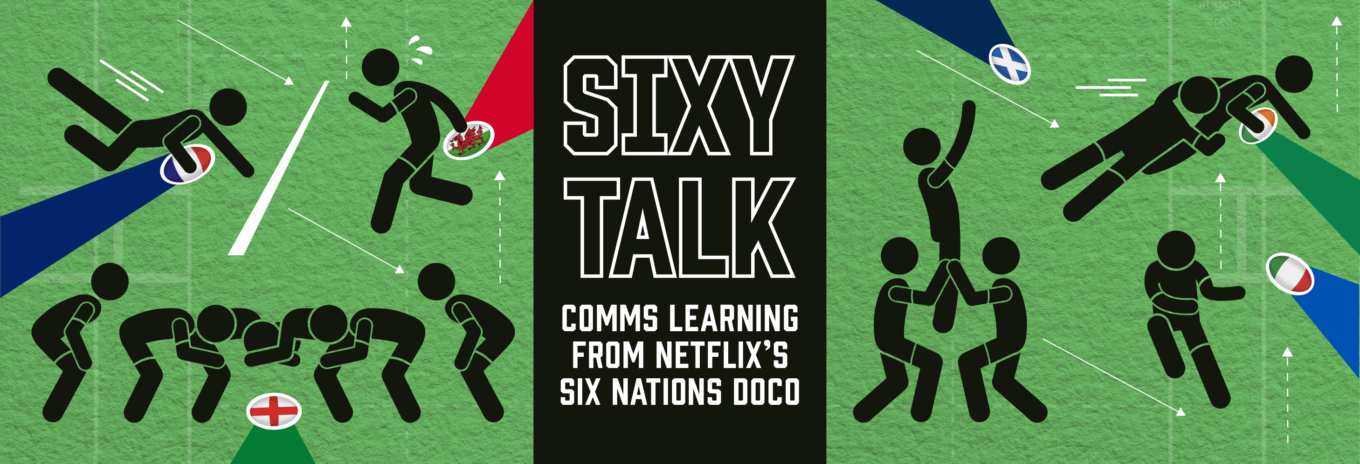It’s that time of year again.
The local pub is filled with people in gilets and jeans, nursing Guinness and muttering about flankers and hookers.
On the TV, preposterously proportioned players pile on top of one another to retrieve odd-shaped balls.
Yes, it’s Six Nations season, folks. The time to feel an inflated state of national pride/embarrassment for a few weeks.
This year, the action on the pitch has been glimpsed through a new lens, thanks to Netflix’s fly-on-the-wall documentary, Full Contact.
As with its sporting predecessor, the Formula One-focused Drive to Survive, it provides a fascinating glimpse behind the scenes of elite competition.
If ripped men in various states of undress is your thing, then you’re quids in. But there are also some fascinating insights for comms professionals too. Let’s scrum down – touch, pause, engage!
1. Tackle technical talk 
Does anyone really understand the rules of rugby fully? It’s a mighty complicated game, full of bewildering laws, fine margins and subtle skills.
You could easily imagine coaches getting bogged down in technical mire and incomprehensible details. Yet it’s striking how simple they keep team talks, briefings and rallying speeches.
Clarity of message is everything. Saying less is more, to keep their teams focused on the goal.
We’re fitter than them. We’re better than them. They can’t do what we do.
Simple messages, repeated often. A damn good template to follow.
2. What the ruck? 
Look, it’s a sporting doco fulled by a fair bit of testosterone (and coffee. And Guinness) so some choice language was always going to bubble over.
Swearing frequently and indiscriminately is pretty unedifying and uninteresting, and usually achieves very little other than offence.
But following in a similar vein to their simple, impactful messaging, the Six Nations coaches ration swears tactically, for emphasis and impact.
The jolting juxtaposition of an explosive expletive in an otherwise calm, thoughtful team talk from someone like Scotland coach Gregor Townsend becomes something powerful and profound.
Big and clever? Probably not, but used carefully and sparingly, the odd cuss cuts through like little else.
3. Contact sport
Culture and the team environment are given enormous importance and value among all the Six Nations squads.
They know togetherness can be the difference between success and failure. So a culture where people are allowed to be vulnerable and make mistakes is prioritised.
Players are encouraged to share personal stories so their teammates understand what makes them tick and motivates them.
Irish coach Andy Farrell reveals that he sees a big part of his job as understanding his players’ backgrounds and pulling together the jigsaw.
A psychologically safe environment is where elite teams are able to achieve.
4. Leader of the pack 
The highs and lows of the Six Nations are starkly shown throughout the series.
With the amount riding on each game, defeats feel terminal and victories are celebrated hard.
In this rollercoaster atmosphere, leadership is tested to the max and it’s fascinating to watch the response of coaches and captains to the ups and downs.
After four consecutive defeats and facing the wooden spoon, Italy coach Kieran Crowley is shown speaking with his coaches. “We’re going to need to bring excitement, positivity and energy to the group this week,” he says, identifying the need to rally his beleaguered troops.
Leaders set the weather, in victory or defeat, and define their team’s outlook for the day or week.
5. Knock-on effects
The intense pressure and spotlight on every game, every action, is made acutely apparent through the documentary.
The mental toll on players of this is huge, and it’s reassuring and revealing to see the prominence given to mental health in the teams’ set-ups.
Sport psychologists have been around for a while but players opening up about mental health is still a relatively recent phenomenon – England captain Owen Farrell cited his mental health as a reason for sitting out this year’s tournament.
Seeing players being encouraged to open up and talk about their particular hang-ups and fears is refreshing.
Italy scrum-half Stephen Varney is shown talking one-to-one with a psychologist about his confidence issues. The advice? Focusing on being perfect is a one-way ticket to failure, so just focus on being committed to every action you take instead.
James Morton for Alive!
—
Try as we might, achieving the physical pinnacles of Six Nations players are probably a way off for most mere mortals.
But turning over the comms lessons from these elite athletes and coaches – that’s something we can all tackle.
















